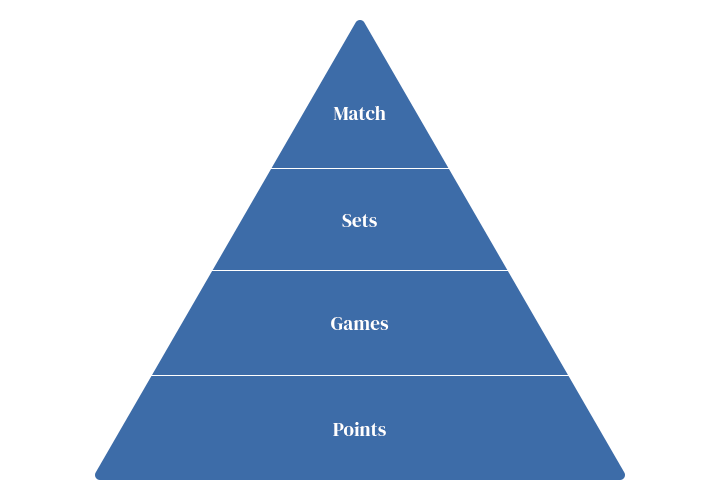Check out my custom vibration dampener
What is a Set in Tennis?
A Clear & Thorough Explanation
If you’re new to tennis and learning how to play, watching a match live or on TV, you’ll likely be looking for clarification on how a set works in tennis.
Although I’m a fan of the tennis scoring system’s quirks, it’s unfortunately not the easiest to pick up and can take some time to learn.
This article will provide a detailed explanation of a set in tennis and then dive into the nuances of this scoring mechanism, including its use at important tournaments, intriguing stats, and common sayings to help you become more fluent when talking about it with friends and family.
Article Contents
Click below to jump to a section
Tap below to jump to a section
What is a Set in Tennis?
Grand Slams
Olympics
Set Statistics & Records
Common Sayings
Wrapping Up
New to TennisCompanion?
Create a free account and explore my latest videos below
What is a Set in Tennis?
A set is a unit of scoring in tennis that players use to keep track of their progress or results in a match. The following diagram outlines the hierarchy of scoring mechanisms in a tennis match.

Match: the entirety of a competition
Set: there are anywhere from 2 to 5 sets in a match
Game: there are a minimum of 6 games in a set
Point: there are a minimum of 4 points in a game
Here’s a quick recap of the point system in a game:
- Love = 0 points
- 15 = 1 point
- 30 = 2 points
- 40 = 3 points
- All = Tie score
- Deuce = 40-40, i.e., each player has 3 points
- Advantage-In (Ad-in) = Server wins the deuce point
- Advantage-Out (Ad-out) = Recieve wins the deuce point
When playing, opponents typically compete in a best of three sets match, i.e., the first player who reaches two sets wins the match. However, some men’s professional competitions are contested as best of five sets, which is the maximum used by the sport.
There are three types of sets in tennis, which dictate the number of games a player must earn to win the set.
- Tiebreak set (most common)
- Advantage set
- Pro set
Individual tournaments dictate the type of sets, but you’ll most commonly find tiebreak sets played in professional, collegiate, high school, club, and recreational tennis worldwide.
Tiebreak Set
A player or team needs to reach six games to win a tiebreak set. However, if both players earn a score of 5-5, otherwise referred to as 5-all, one player must win two consecutive games to win the set.
In the above scenario, one player can win the set by achieving a score of 7-5 in games. However, If the score reaches 6-6 or 6-all, players compete for the set in a tiebreak game.
One player must reach 7 points in a tiebreak and win by two. Therefore, a player can win the tiebreak with any of the following scores:
- 7-0
- 7-1
- 7-2
- 7-3
- 7-4
- 7-5
If opponents reach a 7-6 score, one player must still win by two, so the game continues indefinitely until that happens.
Tiebreak sets are popular because they tend to be faster, which means players spend less time on the court, and fans don’t have to hang around for too long to see the match’s outcome.
Advantage Set
A player or team must reach six games and win by two to win an advantage set, so the lowest score in an advantage set is 6-0, while there is no limit to how high the final score in games could be.
For example, players could contest an advantage set to 70-68 in games, as happened during the ATP’s longest match at Wimbledon in 2010.
Although less popular in modern tennis, Roland Garros, otherwise known as the French Open, used an advantage set in the final set until 2021, and Wimbledon used it until 2018.
Many players appreciate advantage sets for the grit it can take for players to compete and earn the win. However, there are two main downsides.
First, if a player goes the distance in an advantage set, they’ll use up significant energy, and it’s unlikely they’ll be able to recover in time to compete effectively in their next match.
Second, they have a greater tendency to result in longer matches, resulting in fans dropping off when watching and making it difficult to sit through the match to witness the outcome.
Pro Set
A pro set is a slight extension of a tiebreak set. However, instead of requiring players to reach six games and win by two, players contesting a pro set must earn eight games and win by two.
Similar to tiebreak sets, if players reach a score of 7-7 or 7-all, then a seven-point tiebreak game is played to win. Once again, in the tiebreak, the first player to get seven points and win by two wins the set.
Pro sets are ideal for younger boys and girls tennis to prevent children from overexerting themselves during a match. For example, kids may play a single eight-game pro set instead of a best of three-set match.
I’ve also seen pro sets in use at the collegiate level when teams run out of daylight, and there are no lighted courts. Doing so helps speed up the competition and ensures one team goes home the winner.
Grand Slams
Historically, each Grand Slam offered slightly different rules regarding how players contested a fifth and deciding set, but that might be changing soon.
Before 2022, here’s how each Grand Slam played the final set:
- Australian Open: Players compete in a ‘first to 10,’ win by two, tiebreak once the score of the last set reaches 6-6.
- French Open: In the final set, players compete in an advantage set.
- Wimbledon: Players compete in a ‘first to 7,’ win by two, tiebreak once the score of the last set reaches 12-12.
- US Open: Players compete in a ‘first to 7,’ win by two, tiebreak once the score of the last set reaches 6-6.
It’s worth noting that players use tiebreak sets for all other sets when competing at these tournaments.
Although unique, these varying scoring methods were confusing for fans, and the advantage set often resulted in excessively long matches. The latter could make it difficult for players to compete in their next match if they won and could be tiresome for fans to watch.
Enter the tiebreak trial introduced by the Grand Slam board.
Tiebreak Trial
In March 2022, the four Grand Slam tournaments, including the Australian Open, Roland Garros (French Open), Wimbledon, and the US Open, agreed to a year-long trial of a 10-point tiebreak in the final set if the score reaches 6-6 to bring greater consistency to scoring between them.
Doing so breaks tradition with long-standing differences between how players compete to win the final set at the majors.
The goal of the tiebreak trial for the fifth set in all Grand Slam tournaments is to bring greater consistency in rules, thus enhancing the experience for fans while also reducing the physical impact on players who had previously endured lengthy sets.
Olympics
Tennis players worldwide compete at the Summer Olympics every four years, and the match format depends on the event.
For men’s and women’s singles, players compete in a best of three-set match format, where the first to win two sets wins the match.
However, when it comes to men’s, women’s, and mixed doubles, players compete in a 10-point tiebreaker when reaching a tie score of 1-1 or 1-all.
Changes for 2020 Olympics
Ahead of the 2020 Olympics, the International Tennis Federation (ITF) announced a change to Olympic match formats moving forward.
Previously, the men’s gold medal match was a best of five tiebreak sets, but they shortened it to a best of three tiebreak set match.
For men’s and women’s doubles, the ITF changed the matches from a best of three tiebreak sets to a 10-point tiebreak at 1-1 or 1-set all.
According to the ITF, they made these changes to reduce player fatigue for players who reached the latter rounds of the Olympics. Considering many players skip the Olympics due to a tight schedule on the ATP and WTA tours, these changes may also influence participation.
Set Statistics & Records
Looking to dive into the weeds with some statistics, records, and common questions about sets in tennis? Check out the following, many of which may surprise you and are fun to share with friends and family.
Fastest Set
On the men’s side, Jack harper defeated J. Sandiford 6-0, 6-0 at the Surrey Open Hard Court Championships in 1946 with a total match time of 18 minutes. Then in 2001, Francisco Clavet beat Jiang Shan 6-0, 6-0 at the Heineken Open Shanghai.
Unfortunately, single set times are not available, but you can get a sense of how quickly they went based on the total match times.
The shortest set on record for women is when Helen Wills defeated Emily Wright 6-0, 6-0, winning the first set in nine minutes. However, several other matches were over in under 25 minutes, but there is no account of the individual set times. They include:
- Sue Tutt def. Marion Boundy 6-2, 6-0 in 20 minutes
- Suzanne Lenglen def. Molla Mallory 6-2, 6-0 in 23 minutes
- Margaret Court def. Darlene Hard 6-1, 6-1 in 24 minutes
- Helen Wills def. Joan Fry 6-2, 6-0 in 24 minutes
- Suzanne Lenglen def. Joan Fry 6-2, 6-0 in 25 minutes
Regardless of how you slice it, those are some quick sets.
Longest Set
The longest set ever recorded also happens to be part of the longest tennis match. In 2010, American John Isner defeated Frenchman Nicolas Mahut 6-4, 3-6, 6-7, 7-6, 70-68 in a match that lasted 11 hours and five minutes and spanned three days.
The fifth set lasted eight hours and eleven minutes, shattering all prior records and one that will be hard to break as Grand Slam events have shifted their rules to encourage faster matches.
Average Set Length
On average, a set in tennis will last roughly 40 minutes. However, keep in mind that averages can skew data, and the length of time often varies depending on the surface. Sets on grass courts tend to be the fastest, clay the slowest, and hard courts somewhere in-between.
Average Match Length by Sets
Using tennis data from Jeff Sackmann’s Github repository, I dug up the average length of ATP matches by the number of sets from 2018 through the first few months of 2022. Here’s what I found:
- Two sets: 84 minutes / 1 hour 24 minutes
- Three sets: 129 minutes / 2 hours 9 minutes
- Four sets: 167 minutes / 2 hours 47 minutes
- Five sets: 220 minutes / 3 hours 40 minutes
Across all ATP matches, regardless of the number of sets, the length of the average match length was 112 minutes or 1 hour and 52 minutes.
Here’s what the data looks like for the WTA:
- Two sets: 82 minutes / 1 hour 23 minutes
- Three sets: 130 minutes / 2 hours 10 minutes
Across all WTA matches, regardless of the number of sets, the length of the average match length was 98 minutes or 1 hour and 38 minutes.
It’s interesting to see how closely the length of men’s and women’s matches are when the matches are two or three sets.
Minimum Points in a Set
If a player wins a set without losing a single point, they’ll do so in 24 points and win the set 6-0.
Maximum Points in a Set
There is no maximum number of points that opponents can play in a set because of the nature of how a player must win each game by two points if they reach deuce.
The same holds if players arrive at a tiebreak, where one individual must win the tiebreak by two points if players reach a score of 6-6 in a traditional 7-point tiebreak. Similarly, players must reach six games in an advantage set and win by two. If opponents reach a tie score of 6-6, the match could continue for many more points.
Average Points in a Set
In a 2006 study, Ales and Tjasa Filipcic reviewed ATP tennis matches at 2001 Grand Slam tournaments, and one of the data points they tracked was the average number of points in a set.
Across data publically available for four matches and 15 sets, the average number of points per set was 59.
Average Games in a Set
Manipulating tennis data from Jeff Sackmann’s Github repository, I found that across more than ten thousand matches from 2018 to 2022 that the average number of games in a set is 9.83.
Best Players in Five Sets
According to ATP player data, Bjorn Borg, one of the greatest tennis players ever, has the best five-set record, winning 81.8% of his matches.
Below, I’ve included the top ten players when it comes to five sets.
| Player | Country | Win % | Record |
| Bjorn Borg | Sweden | 81.8% | 27-6 |
| Jean Borotra | France | 81.8% | 27-6 |
| Johan Kriek | America | 81.8% | 18-4 |
| Henri Cochet | France | 80.0% | 16-4 |
| Bill Tilden | America | 80.0% | 16-4 |
| Kei Nishikori | Japan | 79.4% | 27-7 |
| Novak Djokovic | Serbia | 78.3% | 36-10 |
| Marcel Bernard | France | 77.3% | 17-5 |
| Tommy Robredo | Spain | 77.3% | 17-5 |
| Aaron Krickstein | America | 75.7% | 28-9 |
As you can see, the margins are pretty narrow. For example, Djokovic could surpass Nishikori with three additional five-set victories. Regardless, these records are all hugely impressive.
Common Sayings
More than a handful of sayings involve the term set in tennis, so let’s take a look at each along with their meaning.
Game, Set, Match
When a player wins a match, the phrase “Game, Set, Match” is frequently used to express that the player has won. By winning the final point of the match, the player wins the game, wins the set, and wins the match.
Example: “That’s game, set, match for Federer.”
Straight Sets
Straight sets refer to a scenario where a player wins their match without losing a set. In a best of three sets match, a player who wins two sets in a row wins in straight sets. In a best of five sets match, a player who wins three sets in a row wins in straight sets.
Straight sets victories are advantages for players as they progress through a tournament. It usually means they’ve won convincingly and spent less time on the court, thus keeping their bodies fresher.
Example: “Up until the semis, Swiatek had a solid tournament with straight-sets victories over all his opponents.”
Golden Set
A player wins a golden set when they avoid losing a single point in a set, which means they only had to play 24 points to accomplish the feat.
There are only 15 recorded occurrences of a golden set, only two of which have occurred on the pro tour. A ‘golden match’ takes things a step further where a player doesn’t lose a single point the entire match.
Example: “Who do you think would be most likely to win a golden set, Nadal, Federer, or Djokovic?”
Set Point
The last point before the conclusion of a set is a set point. In other words, the player in the lead only needs to win one more point to take the set.
A set point is also a game point, but it’s more significant. Furthermore, a set point to win a match is a match point.
Example: “Serena has set point. If he can close out this set, he will be in good shape because his opponent is looking tired.”
Bagel
When a player defeats their opponent 6-0 in a set, the tennis community often refers to it as a bagel because the zero resembles the shape of a bagel. You may also hear the term double bagel, when a player wins the match 6-0, 6-0.
Although the notion of a triple bagel exists in a five-set match where the player wins 6-0, 6-0, 6-0, it’s rare. Since the start of the Open Era in 1968, there have only been 17 occurrences in professional tennis.
Example: “Sinner served up a bagel in the first set. Let’s see if he can keep up the strong momentum in the second.”
Dropping a Set
When players lose a set, they have “dropped” the set. Fans often use this phrase when looking back at a player’s results.
Example: “Barty hasn’t dropped a set this entire tournament, so her legs should be fresh heading into the finals.”
Up or Down a Set
When players have one more set than their opponent, they’re up a set. On the other hand, if they have one less set than their opponent, they’re down a set in the match.
Example: “Monfils is up a set, but he’s getting a little careless in the second. If he can’t tighten up his game, he will be in trouble.”
Deciding Set
In tennis, the deciding set is the match’s final set. In a best-of-three-set match, where one player needs to win two sets to claim victory, the third set is the deciding set.
Similarly, in a best-of-five-set match, where one player needs to win three sets to claim victory, the fifth set is the deciding set.
Example: “Fans are in for a treat as we head into the deciding set of the ladies’ final in New York.”
Force a Set
When a player is on the brink of losing the match but manages to win a set, they’re forcing the next set or requiring their opponent to play the next set before the match is over.
Example: “Nadal wasn’t playing up to his standards in the first two sets, but he’s managed to force a third set to stay in this match.”
Split Sets
In tennis, players split sets when each wins one set.
Example: “Kerber and Muguruza have split sets, both playing excellent. This match is up for grabs in the third.”
Wrapping Up
Although there’s a bit of a learning curve when it comes to tennis scoring, I promise it becomes second nature after a while.
Hopefully, this article helped shed some light on the term and provide plenty of context for how we use it in tennis. Of course, if you have any questions about what a set is or how players use it, please don’t hesitate to drop a comment below.
Play Better Tennis
Improve your game alongside our community of tennis players
Why join?
Discussion Boards
Join the conversation with other members of the community.
5 Point Friday
Read our weekly recap of the 5 most interesting things we dig up in tennis.



Leave a Reply
Want to join the discussion?Feel free to contribute!